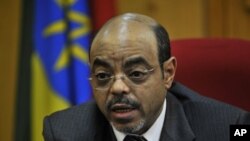Africa's top climate negotiator says a loss of global momentum has lowered the chance of a breakthrough at the upcoming summit in Cancun. African leaders are already looking ahead to the next climate summit in South Africa.
Ethiopian Prime Minister Meles Zenawi says the negotiating environment for a climate treaty has deteriorated since last year's much anticipated summit in Copenhagen. That gathering failed to agree on extending targets to limit carbon-dioxide emissions.
Mr. Meles will lead a delegation representing 53 African countries at the Cancun talks beginning later this month. He suggests global economic troubles and pressing domestic issues in many countries have pushed climate concerns to the back burner.
"Globally there appears to be some loss of momentum. Many leaders who could have provided the leadership are hamstrung by all sorts of domestic considerations, so we are disappointed that this is indeed the case,"he said.
Mr. Meles says the best Africa can hope for is progress on some specific issues that could be built on in preparation for next year's Johannesburg summit, the final session of U.N. climate talks before the 1997 Kyoto Protocol expires.
"The continuation of the legal framework of the Kyoto convention is one of the issues that are being discussed and on which there is no agreement as yet. We need to make sure a legal vacuum is not created because the Kyoto protocol ends in 2012. But I am not sure we will make serious progress on this matter in Cancun," he said.
Mr. Meles says while prospects for a successor to Kyoto may seem distant, there has been significant progress in forging a unified African position on climate change. Efforts to achieve continental unity at the Copenhagen summit were undermined by disagreements between rich and poor African nations.
But Mr. Meles says early problems have been overcome.
"Like all new things there are bound to be some teething problems. And indeed we had some teething problems in Copenhagen, but we have overcome these teething problems and we will be able to speak effectively with one voice in Cancun," he said.
Mr. Meles cautioned Africans not to expect much from the Cancun talks. A year ago, pre-summit comments focused on establishment of a fund through which wealthy countries would pay hundreds of billions of dollars a year to help poorer nations overcome the negative effects of climate change.
This year, the rhetoric has been more muted. In his comments to reporters, the Ethiopian leader made no mention of compensation. Instead, he said, "what we can say is we will persevere ... to push the African position through these negotiations, and we will persevere to protect Africa's interests".
African Leaders Downplay Prospects for Climate Deal




